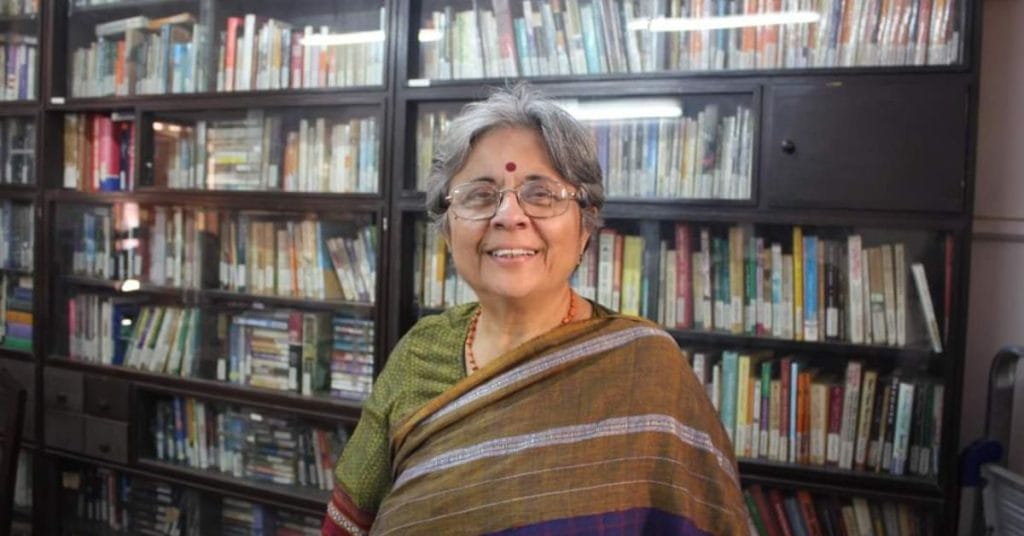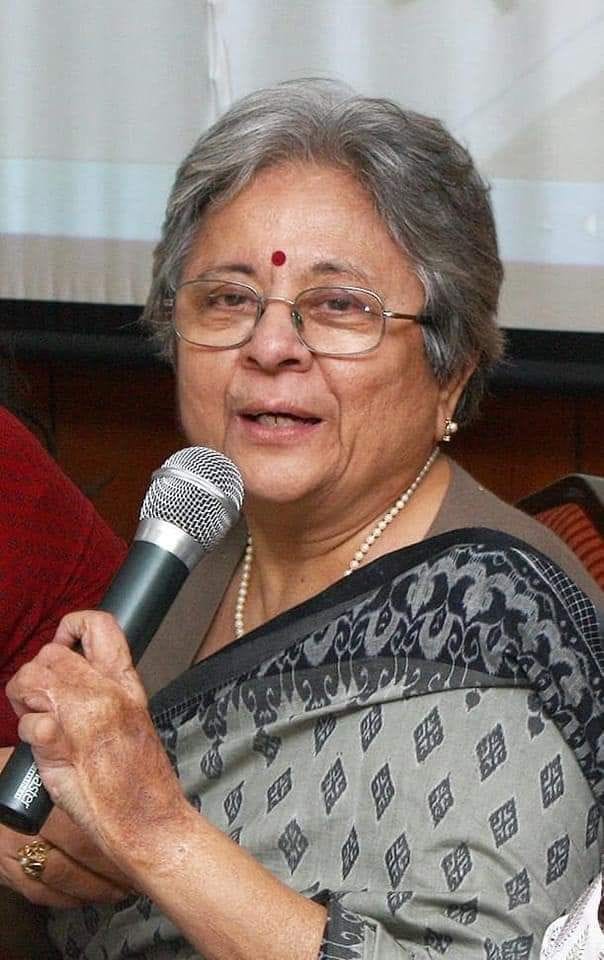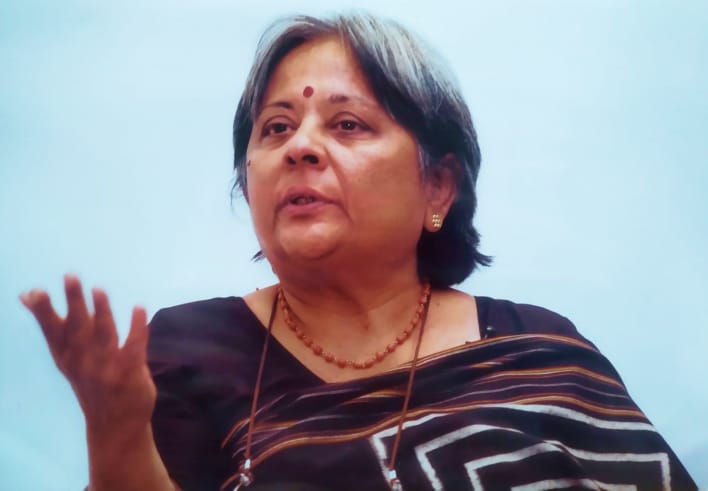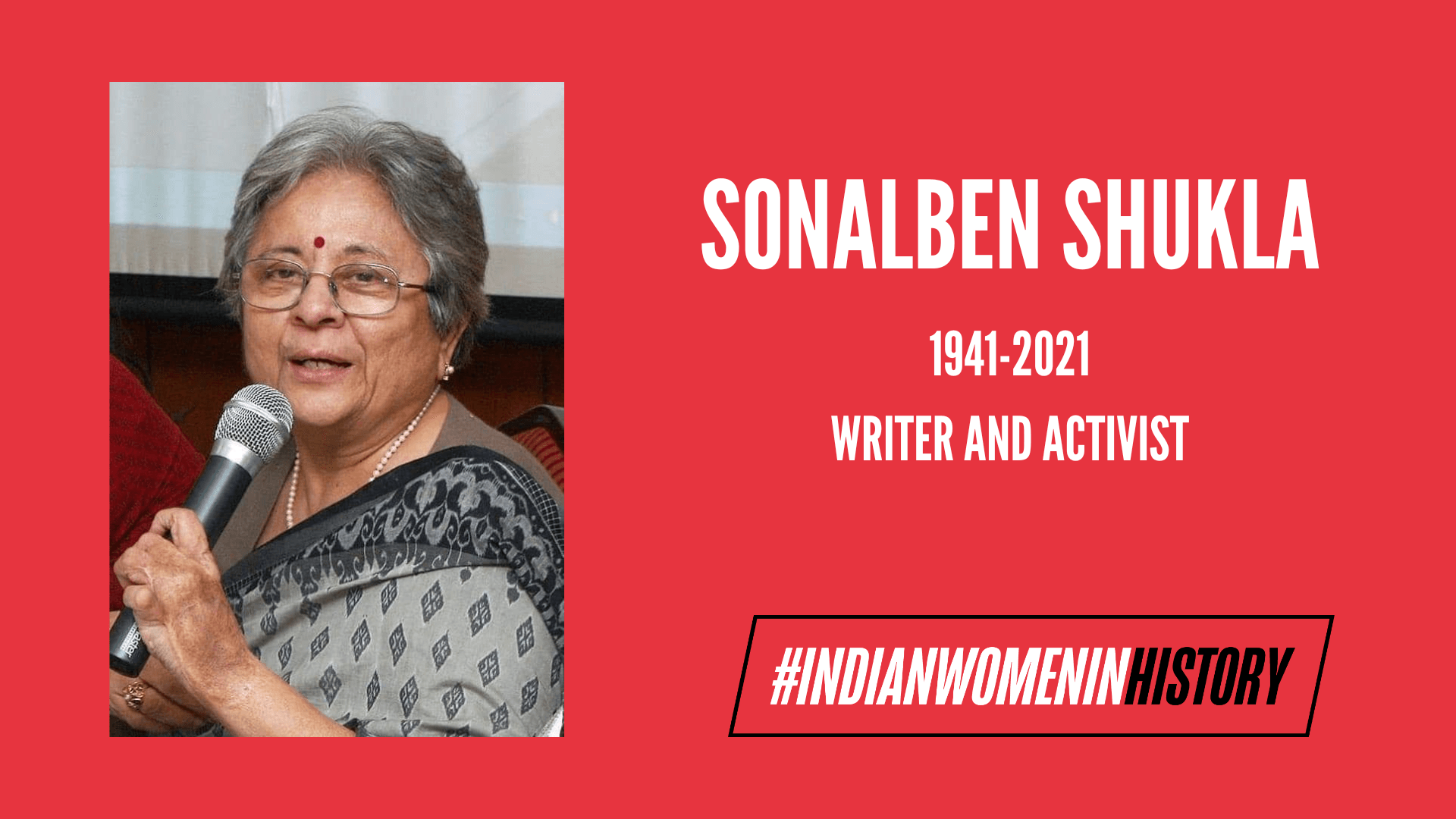In an interview for the documentary Unlimited Girls, Shukla was asked, “Sonalben, what are the goals of the Indian women’s movement?” Shukla replied with unflinching conviction, “To change the world, no less.”
Her name becomes very prominent when talking about the Indian feminist movement. Shukla was a key figure leading the protests in the aftermath of the Mathura rape case. Along with some feminist colleagues, she formed the Forum against oppression of women. This forum later successfully led a movement to reform the rape laws in the country. Sonal Shukla started the Vacha Foundation in 1987, and it was registered as a trust in the early 90s. Vacha works to educate and empower adolescent girls of all backgrounds in Mumbai’s slums. For many years, Shukla ran Vacha out of her own home as a research library before it was later registered as a trust.
Sonal’s early life
Sonal Shukla was born in Varanasi in 1941 into a family deeply connected with music and art. Her father Ninu Majmudar was a musician and a radio presenter, often recognised for creating the Vividh Bharti for India’s national broadcaster, All India Radio. Her mother was Kaumudi Munshi, a classical singer. Shukla completed school education in her mother tongue, Gujarati, and later began writing columns in the same language instead of English in order to reach the targeted audience, women.

Shukla started her career as a teacher and later a lecturer with an M.A. in Literature and an M.Ed. in comparative education. Shukla was very much influenced by Gandhian philosophy and was introduced to its studies during her higher education.
Influenced by her mother’s background, Shukla inherited a love for literature and music, and from her father, she gained interest in poetry, dance, and theatre. Through her writings, Shukla promoted intersectional perspectives. From the late 1970s till the year of her demise, Shukla wrote weekly columns for two Gujarati newspapers. Her columns focused on highlighting contemporary issues through a gender lens and also talked about the misogynistic influence on literature, stories, and films. Her writings became a staunch stand for a renowned definition of feminism in the Indian context.
In an interview, she mentions, “You can’t be part of a women’s movement or an NGO about women without, for instance, reading about women.” This described importance for a space for women to understand, value, and further defend femininity. She started Vacha with the same motivation to help and educate women, especially those from marginalised communities, and promote women’s writings.
Early in her career, she started getting involved closely with several public initiatives to improve the lives of sanitation workers and indigenous fishing communities in Mumbai. Shukla often worked in the slums of Mumbai, focusing on uplifting marginalised women who belonged to lowered caste communities.
An icon of women’s rights
Sonal Shukla was an activist for women’s rights and kept intersectionality as her core principle. She worked extensively for oppressed and marginalised groups of women. After working as a teacher and a lecturer, she involved herself with the fishing communities and sanitation workers of Mumbai. This experience introduced Shukla to the idea of becoming an activist of the underprivileged. Along with fellow feminist scholar Vibhuti Patel, she formed the Socialist women’s group. It was right from the post-emergency period that Sonalben became active in the autonomous women’s groups and housed the first feminist newsletter (1978-1980), called Feminist network.

In September 1980, the aftermath of the Mathura rape case saw uprisings against the rape laws in the country and opposition to the Supreme Court’s remarks on consent. Four law professors penned an open letter to the Supreme Court to protest against comments made on the moral integrity of the victim , Shukla, and 49 other female activists received a copy of the same letter that very year. It was mailed by her eventual long-term friend, Vibhuti Patel. “It made me so angry, you can’t imagine today. That’s when I felt I couldn’t be an outside supporter as I thought I would be. So far, I was working for women, but now I want to work as a woman. That difference came with the Mathura case,” she told fiftytwo.in.
For Shukla, this became a changing point in her life, and it altered her methods of working for women’s rights. In the year 1980, she became one of the founders of Mumbai’s autonomous feminist group known as the Forum Against Oppression of Women (FAOW). The Forum called for reforms to the rape laws and the reopening of the Mathura case. Many other autonomous groups helped raise the voice against these laws and the deeply rooted patriarchy that made the judiciary able to derogate the victim in the first place.
Thus began Shukla’s decades-long journey on feminism,intersectionality, and marginalised groups that made her one of the most respected activists and feminist scholars of the nation. Over the years she led multiple initiatives with Vacha and kept on writing on intersectionality and gender based oppression in India. In 2021, Friedrich Ebert Stiftung recognised her as a Feminist Icon for their Gender justice hub in India.
Vacha: The epitome of Shukla’s legacy
It is hard to rank the contributions of a person who has stood out as one of the finest advocates of women’s rights in a society deeply rooted with patriarchy and misogynistic practices. Shukla’s journey as a shield for marginalised women advanced after the mid-1980s. In 1987 she started Vacha, a resource centre and library for women. It was registered as a trust in 1990. Shukla envisioned Vacha as a women’s organisation engaged in social action and study. Beginning with a women’s library, Vacha has subsequently expanded to include a children’s center, a cultural center, and a number of community-based programs addressing training, documentation, and research. The aim of Vacha is to pen down this new generation of Indian women into history.

Shukla’s work towards the marginalised sections in the 70s and 80s was continued in Vacha. At the time of its inception, she saw it as a safe space for marginalised and middle-class women to unlearn the conditioned concepts of patriarchal dominance and learn to demand equal rights for women in society as well as their households. Shukla observed that many women had internalised misogyny to a point where they had normalised abuse inflicted upon them by their husbands. Shukla aimed at making the lives of these women better and also to make the adolescent girls at Vacha aware of such situations from their childhood. Throughout the COVID-19 pandemic, Shukla kept in constant contact with the Vacha team to direct its education program and relief efforts, including the distribution of ration kits, sanitary supplies, and computers for online education during the lockdown.
Shukla left a magnificent impact, even in such a tumultuous period by mentoring hundreds of young girls working with honesty of purpose and feminist vision. Shukla had a clear and broad vision for Indian women. She believed in empowerment and enhancing the ability of the country’s women to dominate the spectrums of social life. Shukla’s experiences throughout her journey as a feminist activist equipped her with the understanding of Indian society and why the idea of gender equality gets sacrificed. For Shukla, the dependence on men and ignorance of knowledge and an educated life makes many women believe that gender differences validate superiority of men. Shukla believed in learning and growing through knowledge to challenge an unjust system. Vacha was born through those ideas.
Sonal Shukla as Sonalben
Amongst her friends, family, and peers, Shukla was called Sonalben. “Sonalben’s best qualities was her sense of humour, sharp wit, magnificent and enchanting personality and command over languages- Gujarati, Hindi and English. She was a brilliant and erudite orator,” said Vibhuti Patel, her long-term companion and fellow feminist. Sonalben’s contribution to Vacha continued even after her retirement from its management. Her influence on those working at Vacha was profound and they saw her as an inspiration, someone who had led from the front for women’s rights as an activist and Vacha was made to develop leaders on the same vision.
Yagna Parmar, project director at Vacha, in an interview with The Better India, recalled how working under Sonalben from a very young age changed her views. “Her views on gender, intersectionality, patriarchy…they left a huge mark on me. When I first joined the organisation, I wasn’t sure if women and gender was the field I wanted to work in forever, but her conviction and dedication for the cause helped me cement my decision.”
Aged 80, Sonalben died of cardiac arrest on 9th September, 2021 in Mumbai. In a tribute penned for The Indian Express shortly after her death, playwright Ramu Ramanathan wrote, “I spotted Sonal Shukla for the first time in the 1980s, a feisty woman all pumped up and hollering at the top of her voice during a protest in Mumbai…Sonalben was our Odetta [an American actor and singer often credited as the ‘Voice of the Civil Rights Movement’].”
References:
1. http://www.esocialsciences.org/Articles/ShowPDF/A2021914155734_19.pdf
2. A Feminist Icon Who Spent Decades Educating Girls in Mumbai’s Slums
3. Vacha – Voices of Girls & Women
About the author(s)
Zubair Abdullah is a Sociology major at Jamia Millia Islamia, who writes on
Colonisation, gender and Muslims. He likes to take interest in understanding
Neo-colonial and Neo-liberal theories and their practices in the current world.
European women during World War 1, History of Anti–Semitism and Hindutva
are his current topics of interest.





